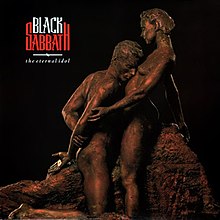The Eternal Idol
| The Eternal Idol | ||||
|---|---|---|---|---|
 |
||||
| Studio album by Black Sabbath | ||||
| Released | 23 November 1987 | |||
| Recorded | October 1986–March 1987 | |||
| Studio |
Air Studios, Montserrat Air Studios and Battery Studios, London, England |
|||
| Genre | Heavy metal | |||
| Length | 42:42 | |||
| Label |
Vertigo Warner Bros. (US/Canada) |
|||
| Producer | Jeff Glixman, Vic Coppersmith-Heaven, Chris Tsangarides | |||
| Black Sabbath chronology | ||||
|
||||
| Professional ratings | |
|---|---|
| Review scores | |
| Source | Rating |
| Allmusic | |
| The Rolling Stone Album Guide | |
| Classic Rock | |
| Martin Popoff | |
The Eternal Idol is the thirteenth studio album by English Heavy Metal band Black Sabbath, released on November 23, 1987. It is the first Black Sabbath album to feature vocalist Tony Martin. It spent six weeks on the Billboard 200 chart, peaking at 168. It was also the last full album of new material by Black Sabbath to be released by Warner Bros. Records (in North America), and the final album through their original label Vertigo Records until the release of 13 in 2013.
The album cover was intended to feature a picture of an Auguste Rodin sculpture from 1889 – also called "The Eternal Idol"; however, the album cover actually features two naked models covered in paint and positioned to resemble the piece of art because permission to photograph the actual sculpture could not be secured. The paint had toxic effects and the models had to go straight to hospital at the end of the photo shoot. Despite the sleeve credits, which cites Dave Spitz as bass player, all bass parts were completed by Bob Daisley, and Eric Singer completed all drum parts. The percussion credit to Bev Bevan relates to a few cymbal overdubs on "Scarlet Pimpernel".
The album was originally to be recorded with Spitz and vocalist Ray Gillen. The former was replaced by bassist/lyricist Bob Daisley during the initial sessions on Montserrat with producer Jeff Glixman, and the latter quit shortly after their return in England. He later joined the band Blue Murder.Tony Martin was hired and reconstructed the vocals under the guidance of Chris Tsangarides at Battery Studios shortly before production ended. Most tracks were written by Tony Iommi and Bob Daisley (the vinyl version states that all songs were written by Iommi), although some lyrics were subsequently modified by Geoff Nicholls. Tony Martin said he "only sang on, and had no part in writing" The Eternal Idol, but nonetheless "thought [it] was one of the better albums of the band."
...
Wikipedia
